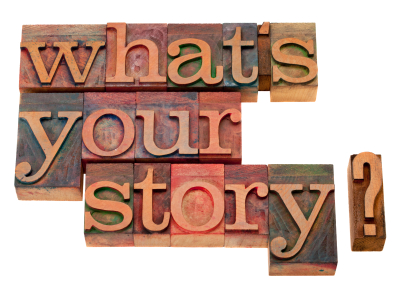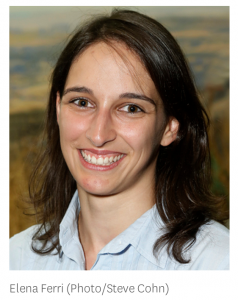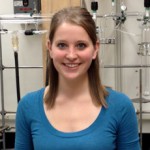Elena Ferri is a graduate student in the Chemistry department, and is advised by Charles McKenna. They are working on a potential health gain by inhibiting a particular protein. In 2012, she was awarded the Chateaubriand Fellowship, which supports Ph.D. students who want to do research in France. She shared her fellowship experiences with us.
Category Archives: Articles
SPOTLIGHT: Max Greenberg, Haynes Lindley Fellow
Max Greenberg is a Ph.D. candidate in the Sociology department, advised by Michael Messner. He was awarded the Haynes Lindley Doctoral Dissertation Fellowship for his studies concerning the effects of youth violence prevention programs in Los Angeles. Continue reading
Shifting Societal Perception Away From the “Mad” Scientist
 This guest post about the public perception of science is by Brian Leung, a third-year Neuroscience graduate student and NSF GRFP Fellow. He is advised by Terence Town, and they are researching how prolonged activation of the immune system can influence learning and memory. Continue reading
This guest post about the public perception of science is by Brian Leung, a third-year Neuroscience graduate student and NSF GRFP Fellow. He is advised by Terence Town, and they are researching how prolonged activation of the immune system can influence learning and memory. Continue reading
SPOTLIGHT: Nada Ayad, Josephine de Karman Fellow
by Adam Feinman
Nada Ayad is a graduate student of Comparative Literature, advised by Antonia Szabari. She is studying the literature of Egyptian revolutions of the last 100 years, including the Arab Spring revolutions in Egypt. Nada has been awarded both the Fulbright and the Josephine de Karman fellowships.
Info sessions — Maximizing your graduate/fellowship experience
Carrie McCarthy is a Ph.D. student in Chemistry, working in Prof. Richard Brutchey’s lab. Read on as she shares the beginning of her experience as an NSF fellow, and how Graduate School info sessions have helped her. Continue reading
Beyond the Ph.D., as seen by Guest Blogger Adam Feinman
Thank you to guest blogger Adam Feinman for synthesizing the wisdom presented at the 2014 Beyond the Ph.D. event last month.
 From the Badges series…
From the Badges series…
Beyond the Ph.D.
By Adam Feinman
On Thursday, March 13, USC’s Postdoc Association held its annual event, “Beyond the Ph.D.”, designed to provide advice and perspective to Ph.D. students and postdoctoral fellows in all fields who all need to have a real job someday and may not be sure what to do. After all, graduate advisors tend to encourage remaining in academia, being that they love it. I live-tweeted as much as I could under the hashtag #BeyondThePhD. I went to panels for engineers, but I think the advice I heard was very generic.
I’ve been grappling for a long time with the question of what path to take when I graduate. I was hoping to find some clarity by attending this conference, and that was a total fail. Everybody selected to speak at events like this loves what they do and couldn’t imagine themselves being happy in a different area.
I’ll spend more time going into some of the advice and perspectives presented, but if there was one take-away from the conference I think everyone could benefit from, it was:
“Looking for jobs is like throwing a hand grenade; close is good enough!”
That’s right, folks. There is nothing wrong with pursuing your dreams, but there may come a point at which you will need to just get a job. But those who hold a Ph.D. have two things in common: intelligence, and a need to be creative. If your dream job is not available, you can rest assured that you can find a job in which you’ll be able to find happiness and satisfaction.
This was a piece of advice every panel echoed. The above statement came from the industry panel. The academic version of this advice was: “A Ph.D. is a license to think; it doesn’t lock you into a field.”
This tweet got a lot of attention, mostly positive. It seems to resonate. Of course, Twitter forces conciseness, so I got some misinterpretations too…
“Hi. I agree that a institutional grade it’s not a fence, but no one need a grade from anywhere to think.”
I’m willing to forgive here that this person didn’t speak English and that they didn’t have any context. The real point of the quote was the second half. A Ph.D. is merely a credential that shows you know how to initiate a research project, provide and analyze evidence, and draw conclusions. The field you end up working in will be a combination of your expertise, your research vision, and circumstance.
Other good advice:
“RT @USCCareerCenter: PhD transferable skills: probability & statistics, problem solving, & teaching –@EllenLevy at Beyond the PhD Conference”
-
There are two aspects to research: fundamental understandings and applications. You can make a quadrant out of these, and knowing which you fall in can help you know where to go and sell yourself.
-
You’re only as sellable as your ability to communicate.
-
Having a Ph.D. and getting into business is easier than being a businessperson trying to develop an expertise, so we have an advantage.
-
Success is less dependent on your credentials and more dependent on understanding how your field works.
These statements are really true for all fields. In my own words, I tell people that a degree has no inherent value, it’s only as valuable as what you want to do with it. If you want to just be more educated because that makes you a thinking and/or well-rounded person, that’s fine. If you’re thinking about graduate degrees, it’s true that a graduate degree looks good on your resumé, but it doesn’t buy you a job. You have to tailor your education to your job interests and you still have to show you are hirable.
From the industry/consulting panel (one of whom was the science advisor for Battlestar Galactica! And he said “So say we all!” squeeee!)
-
Join meet-up groups, great way to network
-
Current professors joined academia when it was growing, but growth in the job market has plateaued.
-
Robust results are more important than p-values
-
Have to be a good people person
My favorite piece of advice from this panel (aside from the above one):
“If you and your SO have different fields… work in Los Angeles! We have everything here!”
In addition to perspectives on academia, the professors had good interview advice:
-
How many jobs allow you to do whatever you want for seven years as long as you can raise funding for it?
-
Your research statement is who you are. you can emphasize elements of it depending on what you’re applying for, but you shouldn’t be making dramatic changes to it.
-
Use the cover letter of your application explain how you fit into the department and what you can add that they are lacking.
-
Unlike a degree, postdoctoral (PD) fellowships have inherent value. Don’t use a PD as a placeholder. Do a PD and/or choose where to do them based on the skill set you want to develop. Also, be aware of your field’s standards on PDs. (For example, if you’re an engineer, don’t do more than one!)
-
PD is a time when you have a lot of freedom to create and expand your CV without the tenure clock ticking. It also allows you to learn the in-and-outs of academic lab management without the responsibility. Going straight from grad school to faculty could be a rude awakening.
-
Apply to anything that moves; you don’t want your first interview to be at the place you really want to be at.
-
A person who doesn’t doubt their ability to be an academic is probably delusional. The key is to overcome that doubt and prove yourself. Over and over.
-
Make sure job talks are really well rehearsed. Rehearse it in front of people who can nail you on the fine points, but also in front of people not conversant in your field so you can know which points need to be explained more fully as you tell your story.
In the government careers panel:
-
AAAS and the National Academy of Sciences all have policy fellowships. (The former president of the Postdoc Assn. spoke on this panel, she is now an AAAS Fellow in DC.) Many government agencies have their own fellowships.
-
Academic societies (e.g., Society for Neuroscience, The Endocrine Society, etc.) have two groups of employees: policy and education/outreach. Policy workers are the people who advise Congress on any decisions relevant to their field. Education employees research relevant topics and educate practitioners (e.g., neuroscientists, endocrinologists, etc).
-
The title of the job does not define the job, you have to do your homework. The same title in different offices is a totally different job.
-
These jobs are a good mesh between writing, research, and people skills.
Nobody really answered my question about what to do with my life after graduate school. If anything, my current plan has been corroborated: apply hard for academic jobs, but be prepared to look elsewhere sooner than later. I enjoy the flexibility that academia affords; if I’m going to look elsewhere, I’m likely going to need to create a career path that will not merely be creative, but also flexible.
First Guest Blog of the New Year! From Panthea Heydari
 The Neuro-Person:
The Neuro-Person:
Story telling and Interviewing
by Panthea Heydari
In. Getting in. Getting accepted. Getting the job. Proposing the deal. Inventing the thought. Telling the story.
My story.
It’s the beginning of spring semester at USC and slowly, but surely, students are getting into the flow of things. Campus eateries have re-opened from the holiday, the gym is as exciting as ever, and the parking lots (both on campus and at that aforementioned Expo metro rail) are becoming full. But along with the throngs of returning students this year, also come the hopefuls. Those vying for positions in sparkling labs, bright-eyed and bushy tailed, dreaming of making that Nobel Prize discovery…the hopeful prospective graduate student.
Welcome back, kids! It’s judging season. It’s application season. It’s interview season.
Recruitment weekends and interviews are starting to get planned for these prospective hopefuls and it feels odd to think that two years ago, I was here. Reading and re-reading my resume, debating on what would make me seem more of a professional academic…do I go with the Hilary Clinton pant-suit? What about the spectacles? Or did I want to be the casual smart graduate student, rolling out of bed and nonchalantly teetering on an epic discovery? What do I even say at my interview? Do I only talk about my science exploits? Can I say I’m into running? What about animal versus human research? How much of that person do I involve alongside the neuro?

USC was not my first graduate school interview and by the time I stepped onto the HedCo Neuroscience Building, I had some idea of what I wanted my future colleagues to know about me. I wanted them to know my skills, my publication record, and my research capabilities but when I sat down to interview with my dream principle investigator (or, effectively, my boss), what I wanted, more than anything, was to have an actual conversation. Was to tell my story and see if I jived with this mentor.
Could I see myself popping into her office on a whim to discuss a thought? Would she be receptive to my inevitably, at first, naïve questions and, later, self-proclaimed novel associations? Those answers could only come from a genuine conversation, filled with my story and, at the same, listening to hers.
The interview is amazingly complicated and, yet, supremely simple. The concept of the neuro-person is emphasized most during this interview season and a conversation can go far. I encourage you prospective graduate students to allow your person-hood to come out during your interview…talk about what excites you! Get animated! Discuss your skills…and the things you could stand to improve on. Tell your story about how you got here but don’t forget that on the other end, there’s a story too. Ask about their story, what excites them, and see if you could imagine yourself getting enamored by the same things or enthralled enough to direct someone towards something new. That passion will serve you well in the marathon that is graduate school.
The story, your story, will continue to develop even after interview season, and to those of us going into our second, third, or sixth years, that story is still developing. The excitement of the story—the unwritten parts—well, that’s the cliffhanger that keeps you coming back for more. Ultimately, the interview to get into graduate school, the one that concludes your dissertation, that gets you to your post-doc, and maybe even the one that cinches for you the coveted tenure track position, it’s all a story about you. Your research, your interests, your personality, and your connection.
So, let’s hear it. Story time!
Send me your thoughts at pheydari@usc.edu
“Stayin’ Alive, or How I Learned to Stop Worrying and Love the Stress”
From the Badges series…
Stayin’ Alive, or How I Learned to Stop Worrying and Love the Stress
A Primer
By Adam Feinman
I recently returned from a major scientific conference with 30,000 attendees of all stages of academic life. I tweet with people in all fields and specialties. There seem to be two things that are common between all of them. They are all extremely passionate about their work, and many are not handling the pressure and stress of academia well.
Stress and pressure, particularly peer-pressure, are insidious forces. They infect every department in every school. They are present in every walk of professional and academic life. And the higher up the food chain you go, the bigger the stakes.
Stress-related mental health problems (MHPs) presenting as early as the school years are more common than you think. Whatever you think the fraction of the population has one, doubling that fraction is probably more realistic. You may even have one yourself and not realize it.
Now here’s the $64,000 question: if there is potential for graduate or professional programs to crush my life, then why am I doing this to myself???
Alas, we all have to answer this question for ourselves. But the answer is out there, waiting for you to discover it. It’s certainly possible that the answer is to take a break, it’s very common.
For myself, I knew going into graduate school that designing medical devices was what I wanted to do with my life. The fact that it’s stressful doesn’t change that. You may well find that your goals also have not changed, and you can take strength in that. Sometimes. If you’re going to stick with it, you need to answer this question so you can feel good with it. Talk about it with people who know you well and are encouraging, don’t let the cynicism of the jaded poison you.
At this conference, and through other venues, many people have been opening up to me about their experiences, how they are rebuilding themselves, and why they choose to carry on. There is a huge amount of variety in the paths that led to people having problems, and frankly, the stories are inspiring. I will get around to posting some interviews soon, but for now, this is what I have.
Grossly speaking, I feel like there are two paths to MHPs in graduate school. The first is combining the normal, albeit intense, work-related stress of school with life’s curveballs. The second is living with very high work-related stress for long enough without respite. (If you don’t agree with this assessment, email or tweet me, and maybe our discussion will lead to further refinement and interesting blog posts.)
Unfortunately, there is probably nothing we can do to avoid the first kind. Life does not leave us alone, no matter how hard we try. The second kind may not always be avoidable, but some of the tools that can prevent the second kind overlap with the tools that allow people to cope with (and sometimes heal from) MHPs.
There are lots and lots of articles out there on the Internet that I’ve seen over the years, and I’ve personally found most of them to be garbage. But based on what I’ve seen and what others have told me (particularly at this year’s conference), I have some ideas to share, and some encouragement. (Stories will have to wait for futures posts. They are inspiring enough that they deserve full interviews.) A lot of the things I’m going to say will sound like I’m repeating psycho-babble, but give it a chance, think it over, read it again.
It is very easy to deny that a problem exists. Often, MHPs don’t manifest any physical symptoms. Behavior and emotions are affected; productivity and socializing are stunted. But it could feel like just a little bit. And all your friends are also doing that too, right?
Recognizing an MHP and living with it require first and foremost that one be honest with themselves. MHPs are not shameful, and they can teach more about yourself then you might have ever thought possible. But first, you have to admit it exists. You only stand to gain by this admission, and to lose much by denying it. (You can’t really self-diagnose, but admitting that you need help is the first step to getting it.)
The second, and much more difficult, thing to do is to accept it as part of who you are for the time being. We tend to refer to some MHPs as “emotional baggage”. The term has acquired some strong negative connotations, but the analogy illustrates my point here perfectly. The MHP will not evaporate just because you’d rather not have it. Attempting to fight with an MHP is like trying to amputate yourself. Accepting it as part of who you are is like wearing a heavy backpack. It’s heavy, and it affects your life. It limits what you can do and what you can’t. But it frees your hands and your mind to think about other things and to accomplish.
The third, and arguably most difficult point, is to be yourself. This is important to prevention as well. Stress and MHPs are not all of who you are. There likely are other activities you enjoy besides your work. Be it exercise, music, socializing, or other activities, doing things that make you feel good and break up your week will help you feel like yourself. You have to be pretty careful here though. You may enjoy lots of things, but graduate and professional programs require a lot of time. Think carefully about which activities speak most strongly to the person you were before you started on this career path and the person you currently are. Latch onto those few hobbies and never let go.
An additional element to maintaining mental health or living with MHPs is support. Not everybody likes to share their problems with others, but the value of support cannot be understated. Some of your friends will likely understand what you are going through. But finding counseling or group support can be a tremendously useful tool, both in helping you understand what you are going through and in learning how to stop worrying and love the stress.
I don’t have any interviews yet, but for now, here is a link to a tweep’s posts of feelings and advice about MHPs.
http://phdisabled.wordpress.com/2013/11/15/chronic-illness-outside-the-academy-part-2/
I’m an engineer and a scientist, so most of the stories I have to draw on come from those fields. If you are reading this and have a different spin (professional school, humanities, etc.), have stories to share, or have topics you would like to hear about, follow me on Twitter (@AMFeinman) or email me at feinman@usc.edu, I would love to hear your experiences!
Guest Blogger Panthea Heydari Introduces “The NeuroPerson” Series
The NeuroPerson:
A Quest of Science and Society
by Panthea Heydari

Graduate school, especially for scientists, is often considered a bubble from the real world. We student scientists are supposed to be blissfully ignorant to the life beyond our lab benches and outside the confines of mountains of highlighted Pubmed papers. We talk in scientific jargon and balk at the idea of press releases that do not include the full methods section of our carefully dissected experimental paradigms. But this is not really the mantra of the University of Southern California…of the USC Graduate School. USC prides itself on producing not only productive scientists but also well-rounded persons. In today’s age, that well roundedness is the golden ticket to Charlie’s Chocolate Factory where grants are free flowing, papers accepted, and science glamorized at the level of celebrity (which, for the record, I think it should be!).
Let’s talk about the theme and dichotomy of being a graduate student (and in my case, scientist) and a “person”. What does this mean? Is it some esoteric abstraction of wanting to live a complicated and deep life? In reality, should I forsake the day-to-day hubbub of Los Angeles and only be concerned with my own type of science, with no regard to my peers or to who decides on my funding?
Where do I draw that line between mad scientist and productive member of society?
At the risk of sounding like our forlorn great-grandparents, times are different and things are a-changing. The days of walking uphill both ways to school may have changed with the advent of the Culver City Expo Line but our generations of scientists (and graduate students) have challenges that fundamentally question our myopic points of view. Is our particular research really the only thing worth funding? Should there be a hierarchy of science? Does our home department, type of degree, or lab location matter? Are we so separate that from the public in our ability to pick up a Western Blot technique or analyze functional Magnetic Resonance Imaging (fMRI) data?
The nature of our economy and the demands of society have (and should) force student scientists to become more integral members of the community at large. We cannot continue with science being an abstract notion for the elite few—instead, we need it to be more collaborative. Here, there is a shift and fundamental need to still live as a person while we continue as a graduate student. Today, scientists find themselves at an exciting crossroads where interdepartmental programs are becoming more prevalent, where cross collaborations are promoted, and where the view of the scientist drudging along in a lab without a sense of the world at large is diminishing.
There is a need for integration of other disciplines, of social interaction at conferences, of talking the talk and expressing science to the public. For example, take the Brain and Creativity Institute at USC, which, among many of their projects, investigates the relationship between music and the brain using neuroscience methods. Or the mind-blurring number rows upon rows upon rows of posters at the Society for Neuroscience Conference where Alzheimer’s disease Amyloid-Beta plaque analysis is presented alongside cognitive representations of the self and testosterone replacement levels in mice. Or the sold-out TedX Brain Conference at CalTech where neuroscientists, psychologists, and researchers parlayed their life’s work in 15 minutes. These are all examples of community involvement in science and scientists walking the line as a member of society.
 I propose a blog to address these notions of the graduate student scientist versus the person. How do I work towards going to a collaborative conference to promote my work when I cannot fully fit into the bubble of one specific department? What does it mean to be a woman in science and should that even matter? How do I appropriately promote my science to the public, when for years I have been part of the science nerds that, by social norms, are the awkward kids that play with volcanoes and lack in social skills? Where do I go for resources on how to be a “productive member of a society”?
I propose a blog to address these notions of the graduate student scientist versus the person. How do I work towards going to a collaborative conference to promote my work when I cannot fully fit into the bubble of one specific department? What does it mean to be a woman in science and should that even matter? How do I appropriately promote my science to the public, when for years I have been part of the science nerds that, by social norms, are the awkward kids that play with volcanoes and lack in social skills? Where do I go for resources on how to be a “productive member of a society”?
I welcome you to my blog for The Graduate School, “The NeuroPerson”, and hope that in my attempt to become a “neuroscientist + person,” you start to question your own “person-dom” as well.
Send me your thoughts here!
From the “Badges” Series: “New Research — Getting Started”
From the “Badges” series…
New Research: Getting started
By Adam Feinman
There are three questions I want to briefly address about being a new graduate student:
-
How do you choose an advisor/lab?
-
How do you develop original ideas or projects?
-
In particular, how do you develop a dissertation?
Each of these questions could be a book in and of themselves, so I’m just going to throw out some ideas and a story.
Choosing an advisor is an extremely personal process, and there are many factors to consider. In my opinion though, the most important factor is making sure you can have a positive relationship with your advisor. I mean, competence and success are crucial as well, but those are necessary conditions. Once you get past that, being able to click with someone should be a deciding factor. This inherently makes this choice extremely personal and difficult to give advice about. No advisor or lab group is perfect, but you need to feel like you belong. “Impostor syndrome” is a well-characterized phenomenon, and it can kill your career. Better to avoid it by feeling good about the people you work with. (See in my previous post why I don’t think unfamiliar research is a bad thing.)
Once you select an advisor and have an idea of research areas you are interested in, the next major hurdle in the process is actually identifying research questions that haven’t been addressed yet. This is challenging in the best of circumstances. Therefore, the path to good research questions always begins with the infamous literature search.
The girth of academic literature can be an overwhelming ocean to brave, but fear not. There are often lots of good web resources that explain simply the concepts you need to know to get started, and every lab has at least some people (hopefully, but not necessarily, including your advisor) who can and will field your questions.
While the Internet and Google Scholar have simplified the search process significantly, you do need to jump in and start reading at some point. Here are a few tips and tricks I’ve developed or heard over the last few years:
-
You need to have a list of keywords. They should include more general words, but there is a trade-off between specificity and the number of things that will come up in your search.
-
Never read a paper without reading the abstract first! Abstracts will tell you a lot about a project. Often, you don’t even need to read the paper. Sometimes the abstract will tell you the paper is irrelevant to you, and occasionally, the abstract will give you all the information you need.
-
Use citations and references. Every paper has a list of references, and those papers’ abstracts are worth browsing. Also, when you search Google Scholar, below the link to the paper is a “cited by” link that displays all the papers that cited the one you’re looking at as a reference.
-
Search dynamically. Keep updating your keyword list, and don’t stop reading papers just because you have a project going.
Once you get the hang of it, the trick will be selecting a Ph.D.-size chunk of research. In the sciences, this is usually much smaller than you think initially. That was Ryan’s experience.
“Once I got through my literature search, I thought that I had some good projects lined up. But as I began to design the first experiment, it became apparent that just the first project could be a dissertation. Over the course of my graduate work, my advisor and I have changed the shape of my dissertation and narrowed the focus many times before it became manageable. But I’m really happy now with how it’s shaping up.”
I’ve found this to be fairly characteristic of grad school research. Don’t feel bad about progress to graduation being a dynamic process with some degree of flux. Your dissertation only has to be fixed when you turn it in!
I’m an engineer and a scientist, so most of the stories I have to draw on come from those fields. If you are reading this and have a different spin (professional school, humanities, etc.), please email me at feinman@usc.edu, I would love to hear your experiences! Anonymity will be protected.




